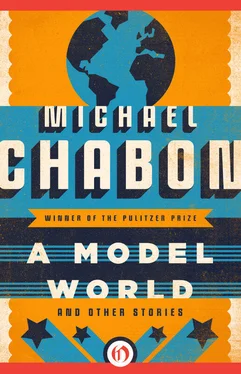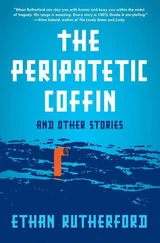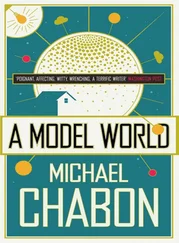Michael Chabon - A Model World And Other Stories
Здесь есть возможность читать онлайн «Michael Chabon - A Model World And Other Stories» — ознакомительный отрывок электронной книги совершенно бесплатно, а после прочтения отрывка купить полную версию. В некоторых случаях можно слушать аудио, скачать через торрент в формате fb2 и присутствует краткое содержание. Год выпуска: 2011, Издательство: Open Road Media, Жанр: Современная проза, на английском языке. Описание произведения, (предисловие) а так же отзывы посетителей доступны на портале библиотеки ЛибКат.
- Название:A Model World And Other Stories
- Автор:
- Издательство:Open Road Media
- Жанр:
- Год:2011
- ISBN:нет данных
- Рейтинг книги:5 / 5. Голосов: 1
-
Избранное:Добавить в избранное
- Отзывы:
-
Ваша оценка:
- 100
- 1
- 2
- 3
- 4
- 5
A Model World And Other Stories: краткое содержание, описание и аннотация
Предлагаем к чтению аннотацию, описание, краткое содержание или предисловие (зависит от того, что написал сам автор книги «A Model World And Other Stories»). Если вы не нашли необходимую информацию о книге — напишите в комментариях, мы постараемся отыскать её.
A Model World And Other Stories — читать онлайн ознакомительный отрывок
Ниже представлен текст книги, разбитый по страницам. Система сохранения места последней прочитанной страницы, позволяет с удобством читать онлайн бесплатно книгу «A Model World And Other Stories», без необходимости каждый раз заново искать на чём Вы остановились. Поставьте закладку, и сможете в любой момент перейти на страницу, на которой закончили чтение.
Интервал:
Закладка:
“No,” said the sleepy little boy in Boston, flowing off away from Nathan on his bed of sweets. “You have nice shoulders.”
It was as Nathan walked with his mother through the woods to the Parnells’ house that he began to feel distinctly altered. These trees were going to be cut down soon, to make way for three new houses, and as he strode, barefaced, across the little wood, there seemed a particular clarity to the starlit Halloween air, a sharpness that hitherto he had only smelled, and the sight of the world struck him with the austere flavor of smoke and dead leaves. Up the street the beam of a child’s flashlight tumbled to the ground, igniting the red oak leaves that littered the Parnells’ lawn, and then flew upward, illuminating the bare tops of previously invisible trees.
“I can’t believe it,” said Nathan. “I must be cured.”
“You look very nice without your glasses,” said his mother. “You look like your father.”
“Dad wears glasses.”
“He didn’t always,” she said. She shivered in her coat, which was made from rabbits and had been the gift of Humberto, the Brazilian professional soccer player she had dated last winter.
“Do you think my concept is stupid, Mom?”
“I just don’t really understand it, Nathan,” said his mother. “I never really understand your jokes. I’m sure lots of people will think it’s hilarious.”
They came to the short incline of yellow lawn which rose to the cedar planks of the Parnells’ front porch, and which was transected by a crooked line of stepping-stones that led to the shallow goldfish pond beside the front door. Major Ray had been stationed for five years in Yokohama during the sixties, and the Parnells had returned with a houseful of Japanese things. The carved pumpkin shared the porch with a stone lamp shaped like a pointed Japanese house, and as Nathan and his mother stepped up to the front door — you could already hear them inside, dozens of laughing adults — it struck him that a jack-o’-lantern was truly a lantern. His last thought before Eleanor threw open the door was an idea for a science-fiction novel in which the denizens of a distant world furnished their lives with various giant vegetables, carving out their beds, dressing in long, curly peels, illuminating their homes with the light of pumpkins. Then the door flew open. In all his anxiety over his own wardrobe, in all the editing and revision of the tortured sentence he intended that night jauntily to pronounce to Eleanor, he had forgotten to wonder about what she might wear, and he found himself taken completely by surprise.
Nathan had been prey, of course, to night fantasies of Eleanor Parnell. He concocted these happy narratives of seduction with the same thoroughness he brought to all his imaginary projects, such as Davor, the Golden Planet, and the vast turnpike, each of its rest stops and motor courts carefully named, that he had once mapped across two hundred pages of his loose-leaf notebook. He had envisioned Mrs. Parnell in all manner of empty rooms, and on desert beaches, and under a remote lean-to in the Far West, but during these trysts she remained demurely clothed. (At those crucial moments when Eleanor began to remove her garments, Nathan’s vision tended to falter.) But he had never imagined her in a black leather bikini, black cape, black boots, and black visor with a great pointed pair of black leather ears.
“I’m Batman,” Eleanor said, giving Nathan a dry kiss on the cheek. “You look wonderful,” she said to Mrs. Shapiro. She stepped back to examine Nathan, and her eyes narrowed within their moon-shaped black windows. “Nathan, you’re a — You’re a lamp. You’re a lamppost.”
“Oh, no,” said Mrs. Shapiro.
“That’s right,” said Nathan the Lamppost. “Ha, ha.” He could not say whether it was desire he felt for her or total, irredeemable embarrassment.
“Nathan,” said his mother. “You are not a lamp. Tell her.”
“Come in,” said Eleanor. “We’re in the Yellow Room. So what are you, Nathan?”
She drew them into the house, taking their hands in her own, as was her habit. The Yellow Room was filled, as Nathan had known it would be, with alcohol and disco music and adulthood in its most intimidating aspect. Two dozen men and women in costume — Nathan spotted a knight, a baseball player, and some sort of witch or hag — held their drinks and shouted mildly at each other over the agitated music, and five or six couples were dancing in the middle of the room. Ever since his mother had become a single woman she had increasingly involved herself, it seemed, with adults who liked to dance — a sight that for Nathan had not lost its novelty. He especially enjoyed watching the diligent men as they jogged in place.
“O.K., I give up,” Eleanor said. She turned to face him and Nathan stopped dead. “No, I don’t.” A pinched look crossed her face as she scanned his body, and she seemed to take in for the first time the poverty of Nathan’s lamentable concept. Nathan blushed and looked away, though this was partly because he feared he had already looked too many times at her breasts and at her radiant stomach.
“Are you supposed to be Thomas Edison? Is that it? Are you Thomas Alva Edison?”
Nathan forced himself to meet the humiliation of her sympathetic gaze. He opened his mouth to explain, to tell her that he was indeed the Wizard of Menlo Park, on the verge of stealing fire.
“He’s a guy in the process of having a good idea for a costume,” said Mrs. Shapiro, crossing her arms and shrugging her tattooed shoulders. “What do you think of that?”
“Nathan,” said Eleanor, smiling at Nathan and taking his chin between the long fingers of her hand. “You’re such a strange young man.”
She laughed her magpie’s laugh, and in her hooded eyes Nathan read both pain and amusement, as though she already knew that he loved her. Then she turned away from him, and the two women put their arms around one another — a habit his mother had picked up from Eleanor, who had learned it from Major Ray, who put his arm around everybody. They went to the long table, draped by a black paper tablecloth, that served as the bar. Major Ray, wearing his Bruce Wayne smoking jacket, came over to hug Mrs. Shapiro. He said something to her, she laughed, and then he led her off to one side, so that Eleanor was left momentarily alone. For a moment Nathan, suffused with the careless, wild-haired courage of an inventor, contemplated Eleanor in her racy suit. He took a step toward her, then another, tentatively, gathering all his strength, as though about to throw a heavy switch that would, if his calculations were correct, bring light to a hundred cities and ten thousand darkened rooms. He was going to ask her to dance — that was all. In the few seconds before he reached her bat-winged side he searched his memory for a suave line or smooth invitation from some movie, but all he could think of at that moment was Young Mr. Lincoln . “Eleanor,” he said, “I would like to dance with you in the worst way.”
Eleanor smiled, then leaned close to him and put her hand on his shoulder, her lips to his ear. For a long time she hesitated. “I know a couple of very bad ways,” she said at last, “but you’re too young for them, Nathan.”
“I suppose so,” he said, almost happily. He doffed his wire hat and set it down on the bar. There was now nothing on his face or his temples, and he felt light, almost headless, as he imagined he would feel on the brilliant evening he tried liquor for the first time. He took her hand, peacefully, and put it over his eyes, then covered her visor with his own damp palm. They stood a moment in this darkness. Then he said, “Guess who I am now.”
The Lost World
Интервал:
Закладка:
Похожие книги на «A Model World And Other Stories»
Представляем Вашему вниманию похожие книги на «A Model World And Other Stories» списком для выбора. Мы отобрали схожую по названию и смыслу литературу в надежде предоставить читателям больше вариантов отыскать новые, интересные, ещё непрочитанные произведения.
Обсуждение, отзывы о книге «A Model World And Other Stories» и просто собственные мнения читателей. Оставьте ваши комментарии, напишите, что Вы думаете о произведении, его смысле или главных героях. Укажите что конкретно понравилось, а что нет, и почему Вы так считаете.












